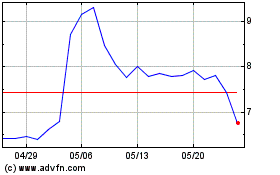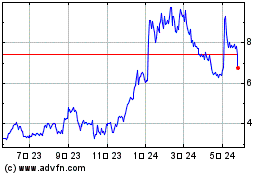Ardelyx, Inc. (Nasdaq: ARDX), a biopharmaceutical company founded
with a mission to discover, develop and commercialize innovative,
first-in-class medicines that meet significant unmet medical needs,
today announced that data supporting additional positive clinical
observations of XPHOZAH® (tenapanor) was presented in a series of
poster presentations at the National Kidney Foundation (NKF) 2024
Spring Clinical Meetings, now underway in Long Beach, California.
Ardelyx is also hosting an Exhibitor Showcase discussing
hyperphosphatemia management.
XPHOZAH, the first and only phosphate absorption inhibitor
(PAI), is approved by the U.S. Food and Drug Administration to
reduce serum phosphorus in adults with chronic kidney disease (CKD)
on dialysis as add-on therapy in patients who have an inadequate
response to phosphate binders or who are intolerant of any dose of
phosphate binder therapy. XPHOZAH offers a different mechanism of
action that blocks phosphate absorption at the primary pathway and
is administered as a single tablet taken twice daily.
“We are excited to share this data, as it continues to
demonstrate the significant impact XPHOZAH can have for patients
with chronic kidney disease on dialysis with serum phosphorus
levels above guideline-established levels, as many currently
struggle to achieve these goals without a new treatment option,”
said David Spiegel, MD, vice president, nephrology at Ardelyx. “Our
commitment is to these patients who are living with a life-changing
diagnosis, and the data being presented at NKF Spring Clinical
Meetings showcases why we believe this treatment will bring
advancement and innovation to their care.”
Poster #239, entitled “Tenapanor
Treatment Added to Phosphate Binders Improved Long-Term Serum
Phosphate (P) Control as Measured by Reduction in Average Daily P
Area Under the Curve,” reviewed data from
an area under the curve (AUC) assessment meant to provide a more
comprehensive evaluation of serum phosphate levels than individual
serum phosphate measurements. The assessment found that tenapanor
added to sevelamer treatment resulted in improved phosphate control
as measured by average daily phosphate AUC in sevelamer-treated
patients from the PHREEDOM Phase 3 study who continued into the
NORMALIZE open-label extension study.
Poster #243, entitled “Treatment
Response to Tenapanor Categorized by Age and Comorbidities: A Post
Hoc Analysis of the PHREEDOM Study,”
reported results from a post hoc analysis of the PHREEDOM study to
evaluate trends in serum phosphate concentrations in patients on
dialysis treated with tenapanor categorized by age and comorbidity
status. The analysis demonstrated that patients aged ≥65 years had
a lower mean phosphate level at baseline than younger patients, but
there was no difference in the mean phosphate reduction from
baseline. Tenapanor demonstrated similar efficacy and safety
profiles in adult patients on dialysis regardless of age group and
comorbidity.
Poster #240, entitled “Patient
Perception of Phosphate-Lowering Treatment Regimen Improves
Adherence to Therapy,” evaluated if an
improvement in patient perception of phosphate-lowering treatment
may improve adherence to treatment and promote a greater decrease
in serum phosphate over time. In the Phase 3 study OPTIMIZE, 80% of
patients enrolled answered a question characterizing their
phosphate management regimen as improved, unchanged or worsened on
tenapanor. By the end of the 10-week treatment period, adherence
was greater in patients who perceived their treatment regimen to be
improved by adding tenapanor and stopping or decreasing their
phosphate binder regimen. Discontinuation rates were also lower
among those who felt their phosphate-lowering treatment regimen was
improved.
Poster presentations are now publicly available and can be
accessed on demand here.
In addition to the poster presentations during NKF Spring
Clinical Meetings, Ardelyx is sponsoring an Exhibitor Showcase
titled “A New Paradigm: Rethinking Hyperphosphatemia
Management,” on May 17, 2024, from 8:30-9:05 AM PDT, where
David M. Spiegel, MD and Lisa Gutekunst MSEd, RD, CSR, CDN, FNKF,
will discuss first-in-class PAI, XPHOZAH. The presentation will
review the XPHOZAH mechanism of action, efficacy and safety data
from the Phase 3 clinical trial program and will include a
discussion about the clinical application of XPHOZAH as add-on
therapy for the many dialysis patients on a phosphate binder with
serum phosphorus levels above guideline-established targets.
About XPHOZAH® (tenapanor)XPHOZAH, discovered
and developed by Ardelyx, is a first-in-class, phosphate absorption
inhibitor with a differentiated mechanism of action that acts
locally in the gut to inhibit the sodium hydrogen exchanger 3
(NHE3), thereby reducing phosphate absorption through the
paracellular pathway, the primary pathway of phosphate absorption.
XPHOZAH is a single tablet, taken twice daily. Diarrhea was the
most common side effect experienced by patients taking XPHOZAH in
clinical trials. Please see additional full Prescribing
Information.
About HyperphosphatemiaHyperphosphatemia is a
serious condition, defined as elevated levels of phosphate in the
blood, which affects the vast majority of the 550,000 patients in
the United States with chronic kidney disease (CKD) on maintenance
dialysis. The kidneys are responsible for eliminating excess
phosphate and as kidney function declines, phosphate is not
adequately eliminated from the body. As a result, hyperphosphatemia
is a nearly universal condition among people with CKD on
maintenance dialysis, with internationally recognized KDIGO
treatment guidelines that recommend lowering elevated phosphate
levels toward the normal range (2.5-4.5mg/dL).
IMPORTANT SAFETY INFORMATION
CONTRAINDICATIONSXPHOZAH is contraindicated
in:
- Pediatric patients under 6 years of age
- Patients with known or suspected mechanical gastrointestinal
obstruction
WARNINGS AND
PRECAUTIONSDiarrhea Patients may
experience severe diarrhea. Treatment with XPHOZAH should be
discontinued in patients who develop severe diarrhea.
MOST COMMON ADVERSE REACTIONS Diarrhea, which
occurred in 43-53% of patients, was the only adverse reaction
reported in at least 5% of XPHOZAH-treated patients with CKD on
dialysis across trials. The majority of diarrhea events in the
XPHOZAH-treated patients were reported to be mild-to-moderate in
severity and resolved over time, or with dose reduction. Diarrhea
was typically reported soon after initiation but could occur at any
time during treatment with XPHOZAH. Severe diarrhea was reported in
5% of XPHOZAH-treated patients in these trials.
INDICATION XPHOZAH (tenapanor), 30 mg BID, is
indicated to reduce serum phosphorus in adults with chronic kidney
disease (CKD) on dialysis as add-on therapy in patients who have an
inadequate response to phosphate binders or who are intolerant of
any dose of phosphate binder therapy.
For additional safety information, please see full Prescribing
Information.
About ArdelyxArdelyx was founded with a mission
to discover, develop and commercialize innovative, first-in-class
medicines that meet significant unmet medical needs. Ardelyx has
two commercial products approved in the United States, IBSRELA®
(tenapanor) and XPHOZAH® (tenapanor). Ardelyx has agreements for
the development and commercialization of tenapanor outside of the
U.S. Kyowa Kirin commercializes PHOZEVEL® (tenapanor) for
hyperphosphatemia in Japan. A New Drug Application for tenapanor
for hyperphosphatemia has been submitted in China with Fosun
Pharma. Knight Therapeutics commercializes IBSRELA in Canada. For
more information, please visit https://ardelyx.com/ and connect
with us on X (formerly known as Twitter), LinkedIn and
Facebook.
Investor and Media Contacts: Caitlin
Lowieclowie@ardelyx.com
Ardelyx (NASDAQ:ARDX)
過去 株価チャート
から 5 2024 まで 6 2024

Ardelyx (NASDAQ:ARDX)
過去 株価チャート
から 6 2023 まで 6 2024
